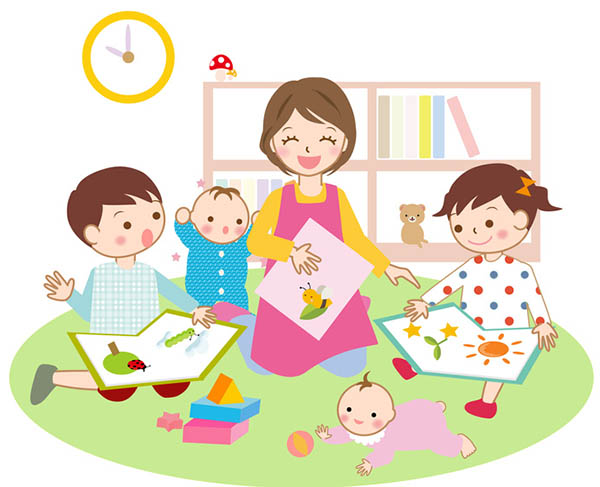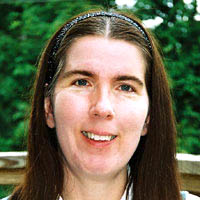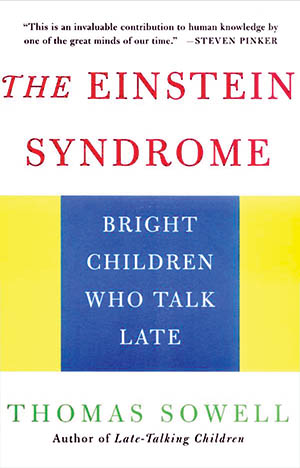Baby Einstein: Preschoolers With Learning Differences
By Melissa Morgan
Printed in Practical Homeschooling #102, 2011.
 Preschoolers all learn at their own rate, and especially those with special needs.
Preschoolers all learn at their own rate, and especially those with special needs.

| 
|
by Melissa Morgan

God doesn’t make cookie-cutter
people—each one of us is unique. Baby Albert Einstein (the real person, not the educational toy) was
one of those very different children. It is said that Einstein had an abnormally large and misshapen
head, was slow to speak, and had difficulty with traditional rote learning. His forgetfulness was
legendary; supposedly he couldn’t even remember his own phone number. Had he been born in the
twenty-first century, he would probably have been put in a special school, perhaps labeled as
developmentally delayed or autistic. Although he attended school sporadically, his mother also taught
him at home, and despite (or perhaps because of) his different way of learning, he eventually matured
into the theoretical physicist who developed the theory of general relativity.
Homeschoolers can maximize their child’s learning gifts, and find ways to
learn in spite of challenges. Just as Einstein didn’t learn well through
traditional methods, you may find that you need to teach your little
“Einstein” differently.
Perhaps other children picked up on the alphabet song in just a few days, but
your child with special needs can’t recite to save his life. Yes,
learning the ABCs is on the developmental milestone chart, but maybe it
isn’t really that important right now. (Especially considering that many
typically developing children recite the ABCs by rote, without any
understanding of what the letters represent.) Instead, it might make more
sense to use an active, hands-on beginning phonics program, concentrating on
the sounds of the letters, before their names. Consider programs such as Sing,
Spell, Read and Write or Love and Learning; find more resources at
nathhan.com/currtest.htm.
Children who can’t comprehend workbook assignments often learn well with
tactile activities and hands-on learning. Try learning through music, mirror
writing (with wipe-off pens), using fingers to write letters in sand,
educational computer games, lapbook learning, alphabet cookie baking, alphabet
letter-bead bracelets, squishing letters in clay, and yes, even educational
toys.

Thomas Sowell wrote a book titled the
Einstein Syndrome in which he described
exceptionally bright people who experience a delay in development of speech.
Parents with children who have various learning challenges have adopted the
term “Einstein Syndrome” to describe how expectations affect
learning, either positively or negatively.
However, the old saying “you can lead a horse to water, but you
can’t make him drink” applies doubly to preschoolers with special
learning needs. Both new homeschoolers and old timers can feel overwhelmed, at
times, by baby Einstein children. My adult children homeschooled from
preschool through college; however, when my youngest was born with special
needs (low vision, medically fragile, and speech challenged) I found out how
little I really knew about child development. Before a child will
“drink the water” of learning, he or she must want to learn, and
be given the tools to overcome learning challenges.
I found encouragement through an article in the NATHHAN (nathhan.com)
Spring/Summer 2010 magazine titled, “Do-it-Yourself Early Child
Development,” adapted from the book, Christian Homes and Special Kids,
by Sherry Bushnell and Diane Ryckman. The article started with the “Baby
Years: a Look at Infant Stimulation and Early Childhood Intervention.”
Ryckman provided biblically-based, abundant, specific information, which could
be easily implemented by parents with children who have special needs.
For instance, she recommended that when providing homeschool-style infant
stimulation and early childhood intervention for your baby with special needs,
there are two simple keys to keep in mind: “1. Know what comes next in
skills development, and 2. Work towards it.”
Ryckman stated that “For some children, input needs to be so much
greater before they will begin to respond…” In addition, the text
provided a wide variety of resources for communication and speech development,
pre-reading skills, pre-writing skills, beginning math skills, and most
importantly, guiding little ones to Christ.
Books such as Choosing and Using Curriculum for Your Special Child and
Learning in Spite of Labels, both by Joyce Herzog, also share practical
methods for homeschooling baby Einstein children. Use a curriculum as a guide
to developmental goals, but try and stay flexible. Tailoring resources to your
child’s individual needs is essential; however, take heart, as
homeschooling is well suited for individualized education.
Often, families feel alone—they wonder if anyone can understand their
struggles and pain. However, homeschoolers can find support and specific
information on challenges such as Attention Deficit Hyperactivity Disorder
(ADHD), Autistic Spectrum Disorders, Down syndrome, giftedness, communicative
disorders, vision and hearing disorders. Home School Legal
Defense Association (HSLDA),
hslda.org, offers a Special Needs Coordinator and
legal assistance. You can find additional resources and curriculum, on my
website:
eaglesnesthome.com.
A homeschool author and mom wrote, “Homeschooling a special needs child
presents many unique challenges. Depending on the learning disability or
specific needs of your child there are a variety of resources available to
you. There are also some unique issues you must be prepared for. When we
adopted our daughter three years ago we knew she had severe hearing loss. We
did not know that at 4-1/2 years old she had no language, no concept of
language or even a self-identity. This presented some real challenges to me.
Thankfully I had three years of homeschooling under my belt so I was fairly
confident as a homeschool mom that I could still teach my daughter. It was
difficult, and remains very challenging, but it is worth the effort.”
(“Teaching Children with Special Needs,” National Home Education
Network). You
don’t need to “walk alone.” Help is available. You will
probably find that your little person, although unique, is in good company
when you network with other families who homeschool with similar gifts and
challenges.
Parents with preschoolers who have learning challenges must cope with the
added difficulty of teaching a strong willed child who cannot understand or
remember directions or language. Although academic skills are important for
success in a modern world, resources such as Better Late than Early, by
Raymond and Dorothy Moore, encouraged us to focus on character and
behavior—not just academics. If you’re struggling with communication
issues, Dr. James D. MacDonald offers resources for parents and families: search for
“Communicating Partners.”
It is often difficult (due to pressure outside the family) to ignore academic
delays and focus on successes, no matter how small or insignificant they may
seem to others. If your developmentally delayed four-year-old finally is able
to say “Mama” using sign language, how can you share your joy with
families homeschooling preschoolers who are reading storybooks and coloring
inside the lines? How can you share, just how miraculous it is, and how much
effort your preschooler must exert in order to learn?
Carol Barnier, wrote at opengifts.org, “I believe that we miss many of
God’s greatest gifts in ourselves and in our children because we fail to
truly open the gifts. Instead we long for our gifts to look and walk and talk
like all the gifts we see in others. We aren’t comfortable being
different in any way. My goal is to convince you that these differences are
the gifts, and to plunge into the delicious process of opening the gifts sent
to us by our heavenly Father, learning to use our uniqueness to live out the
wondrous plan made on our behalf.”
True, most of our children with special needs will not grow up to be
Einsteins. However, each child has unique untapped gifts. In our most
challenging times, Galatians 6:9 tells us to “not grow weary while
doing good, for in due season we shall reap if we do not lose heart.”
Perhaps in this lifetime we may not know why our child must struggle—and it
hurts. We want our child healed, and right now. However, God knows the plans
that he has for us, and our little ones, and He will give us the strength, and
the network, to walk in His ways.
I pray that we have eyes to see our unique special children—God’s
gifts—with God’s eyes.